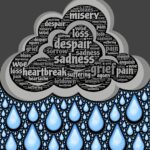Emotions lie at the heart of how you respond to crises. They are the starting point for all of the reactions that we have toward a crisis. They are also be the first obstacle to establishing a positive response to a crisis. That is why it is essential to understand the role that emotions play in how we react with the goal being to gain control of and use our emotions in constructive ways when confronted by crises.
Emotions when confronted with a crisis are the initial reaction from the fight-or-flight response which has been wired into us since we first became homo sapiens (and, in fact, long before we began to walk upright). These feelings have served as the first alert and first responder to people and situations that humans perceived as being a threat to their survival. These emotions were experienced by our ancestors, as they are by us now, as a wake-up call that danger lurks close by.
We experience crisis emotions in ways that guarantee that we pay attention to them and heed their warning. Crisis emotions are immediate. Any delays in recognizing or acting on these feelings could have meant certain death for our ancestors. Crisis emotions are visceral, meaning we feel them in every cell of our physical being. They are overwhelming because our bodies want to ensure that our minds don’t miss or confuse the messages they are sending us. And crisis emotions are always negative. Why, you ask? Think of it this way. Positive emotions aren’t in a hurry; there is no need to feel joy or love or pride immediately. But there is a definite urgency to negative emotions; they are communicating to us that we are in danger and we need to know now. If we don’t get negative emotions fast, we’re dead (or so some primitive part of the brain believes)!
How you respond emotionally to a crisis starts with how you look at it. I have found that a simple distinction lies at the heart of whether you react positively or negatively: Do you perceive the crisis as a threat or a challenge? Whether you view crises as a threat or a challenge sets into motion a diametrically opposed cascade of emotions, thoughts, and behavior that result in either a constructive or harmful response to crises.
Threat
The threat reaction is the one that has been wired into us for millennia whose sole purpose is to ensure our survival. The fundamental motivation behind the threat reaction is to protect yourself from the danger. Your emotions, including fear, frustration, and anger, are visceral and dramatic. Your body is mobilized by the threat response with powerful physiological changes that would help you to fight or flee. Your focus narrows to guarantee that you pay attention solely to the presenting threat. Your confidence takes a hit and your thinking turns negative because this powerful reaction sends you the message that you aren’t capable of overcoming the threat.
This reaction served humans well in primitive times when the crises we faced were obvious and immediate; there was no other choice but to fight or flee. However, due to the amorphous nature of crises today, this defensive posture will more than likely decrease your chances of survival (whether holding onto a job, protecting your retirement portfolio, or keeping your marriage intact).
Challenge
The challenge reaction involves resisting your most basic instincts for self-protection. The fundamental motivation behind the challenge response is to engage the crisis head on, figure out a way to overcome the crisis, and to thrive, not just survive, in the difficult environment that the crisis has created. This challenge mindset creates a physical and psychological state that enables you to direct all of your resources to removing the threat that the crisis presents to you. When seen as a challenge, crises are experiences that, though perhaps not relished or sought out, are at least viewed as opportunities to be embraced rather disasters to be recoiled from. This “can do” mindset, which acts as the foundation for a positive reaction to crises, creates a positive “lens” through which you look at the crisis and also gives you confidence in your ability to overcome the hurdles that the crisis presents to you.
The challenge reaction also prompts in you a vastly different emotional response to the crisis. Instead of the negative emotions that are part of the threat response, such as fear, frustration, anger, and despair (all unpleasant and unhelpful feelings, to be sure), challenge emotions, such as hope, pride, and inspiration (much more pleasant and productive emotions), propel you toward overcoming the crisis you face.
These emotions, in turn, activate a physiological state that better prepares you for reacting positively to the complex nature of crises today. Unlike the intense and uncomfortable emotions associated with the threat reaction, you feel relaxed, but energized, perhaps even fired up to take on the crisis.
This more relaxed emotional and physical condition allows your mind to be clear and intentional. This relative calm in the storm of a crisis enables you to identify key contributors to the crisis, analyze possible options, set reasonable goals, make sound decisions, plot appropriate courses of action, and pursue them with a vigor that wouldn’t be possible in the frenzied state of a threat reaction.
Your ability to respond to crises with a challenge, rather than a threat, reaction could very well determine whether you not only survive the storm that is raging around you, but whether you come out of the crisis stronger than ever.





